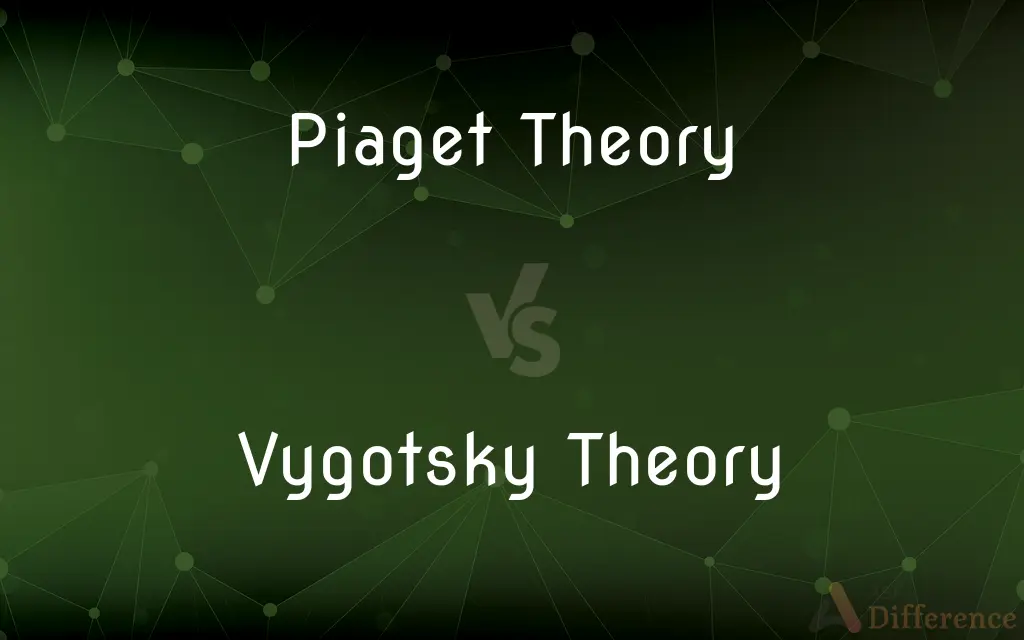Piaget Theory vs. Vygotsky Theory — What's the Difference?
By Tayyaba Rehman & Urooj Arif — Updated on April 22, 2024
Piaget's Theory focuses on individual cognitive development stages, emphasizing self-discovery. Vygotsky's Theory emphasizes social interaction and cultural context as key to cognitive development, highlighting the role of language and social learning.

Difference Between Piaget Theory and Vygotsky Theory
Table of Contents
ADVERTISEMENT
Key Differences
Jean Piaget's Theory of Cognitive Development posits that children move through four distinct stages of cognitive growth, each characterized by different abilities to understand the world. This theory emphasizes the importance of self-initiated discovery and problem-solving, suggesting that children construct their understanding through experiences and interactions with their environment. Lev Vygotsky's Sociocultural Theory, on the other hand, focuses on the critical role of social interaction and cultural context in cognitive development. Vygotsky introduced concepts like the Zone of Proximal Development (ZPD) and scaffolding, highlighting how learning is mediated by language, tools, and the assistance of more knowledgeable others.
Piaget believed in the idea of readiness, implying that cognitive development is a sequential process where children are only able to learn certain concepts once they have reached the appropriate developmental stage. Vygotsky argued that cognitive development is more fluid and continuous, heavily influenced by the child's social environment. He believed learning could lead development, with the potential for accelerated cognitive growth within the ZPD through guided interaction.
Piaget's theory focuses on universal stages of cognitive development, suggesting that the sequence is similar across cultures, while Vygotsky emphasized the impact of cultural differences on cognitive development. According to Vygotsky, the tools of intellectual adaptation vary from culture to culture, significantly affecting how thinking develops.
Piaget’s concept of egocentrism in the preoperational stage—where children view the world solely from their perspective—contrasts with Vygotsky’s view that early development is strongly influenced by social interactions, which help children overcome egocentric thinking. Vygotsky’s emphasis on the role of language in cognitive development also contrasts with Piaget’s later placement of language in the developmental sequence.
Piaget's theory centers on individual exploration and the natural unfolding of cognitive abilities, while Vygotsky's theory posits that social interaction and cultural tools are fundamental to cognitive development. Both theories offer valuable insights into the processes of learning and development, but they differ significantly in their emphasis on the origins and mechanisms of cognitive growth.
ADVERTISEMENT
Comparison Chart
Focus
Individual cognitive stages
Social interaction and cultural context
Key Concepts
Stages of development, schema, assimilation, accommodation
Zone of Proximal Development, scaffolding, language
Role of Language
Develops after cognitive structures
Central to cognitive development
Learning Process
Self-discovery, problem-solving
Guided interaction, social learning
Development Influence
Biological maturation
Cultural and social environment
View on Stages
Sequential and universal
Fluid and continuous, influenced by social context
Educational Implications
Emphasize discovery learning, individual pacing
Promote collaborative learning, use of cultural tools
Theory of Mind
Egocentrism, difficulty understanding different perspectives
Social interactions help overcome egocentrism
Compare with Definitions
Piaget Theory
Egocentrism is seen in the preoperational stage, where children view the world from their perspective only.
A child assumes that their parent knows exactly what they are thinking without them speaking.
Vygotsky Theory
The Zone of Proximal Development represents tasks a child can perform with help but not alone.
A student learns to solve complex math problems through tutoring.
Piaget Theory
Children actively construct their understanding of the world through exploration.
A child learns about gravity by dropping objects from a height.
Vygotsky Theory
Language plays a central role in cognitive development.
A child's inner speech guides problem-solving and self-regulation.
Piaget Theory
Development precedes learning; cognitive capabilities determine what children can learn.
A preschooler cannot grasp abstract concepts like justice until reaching the formal operational stage.
Vygotsky Theory
Learning can lead development, and social interaction is crucial.
A child's ability to remember stories improves after discussing them with adults.
Piaget Theory
Emphasizes the importance of readiness for learning.
Introducing abstract math concepts is more effective when a child reaches the appropriate developmental stage.
Vygotsky Theory
Cognitive development is deeply embedded in social contexts.
A child learns to solve puzzles faster with adult guidance.
Piaget Theory
Cognitive development occurs in stages: sensorimotor, preoperational, concrete operational, and formal operational.
A child in the concrete operational stage begins to understand logic and the concept of conservation.
Vygotsky Theory
Scaffolding supports learning within the ZPD, gradually removed as competence increases.
A teacher provides hints to a puzzle, reducing help as the child gets closer to solving it.
Common Curiosities
Can Piaget's and Vygotsky's theories be integrated in educational practices?
Yes, educators can combine the emphasis on discovery learning from Piaget with Vygotsky's focus on social learning and scaffolding.
How do Piaget and Vygotsky view the role of language in development?
Piaget sees language as a result of cognitive development, whereas Vygotsky views it as central to and a driver of cognitive development.
What is the Zone of Proximal Development?
A concept by Vygotsky referring to the range of tasks that a child can perform with guidance but not alone.
Why is understanding these theories important for educators?
They provide frameworks for understanding how children think and learn, informing teaching strategies that support cognitive development.
How do the theories apply to special education?
Piaget’s stages help identify developmental delays, while Vygotsky’s emphasis on social support informs inclusive teaching strategies.
What is the main difference between Piaget and Vygotsky's theories?
Piaget emphasizes individual cognitive stages, while Vygotsky highlights social interaction and culture's role in development.
Do Piaget and Vygotsky agree on the importance of play in development?
Yes, both recognize play's role, but Vygotsky places more emphasis on its social aspects and potential for learning.
How do Piaget and Vygotsky explain children's learning of cultural tools?
Piaget would view it as part of natural cognitive development, while Vygotsky sees it as crucially mediated by social interaction and cultural context.
How do Piaget's stages of development relate to educational content?
They suggest that educational content should match the cognitive abilities associated with each stage.
How do the theories view the role of errors in learning?
Errors are seen as natural parts of the learning process, with Piaget emphasizing their role in cognitive development and Vygotsky in the context of social learning.
How might technology be used in light of Piaget and Vygotsky's theories?
Technology can facilitate discovery learning (Piaget) and social learning through collaboration tools (Vygotsky).
Can these theories predict learning outcomes?
While they provide insights into cognitive development processes, predicting individual outcomes requires considering many factors.
What does Vygotsky's theory imply for teaching in multicultural classrooms?
It emphasizes the value of leveraging diverse cultural backgrounds and social interactions to enhance learning for all students.
What do Piaget and Vygotsky say about the role of the teacher?
Piaget views the teacher as a facilitator of discovery learning, while Vygotsky sees the teacher as a guide who actively supports learning through interaction.
Share Your Discovery

Previous Comparison
Grey Matter vs. White Matter
Next Comparison
Compression Wood vs. Tension WoodAuthor Spotlight
Written by
Tayyaba RehmanTayyaba Rehman is a distinguished writer, currently serving as a primary contributor to askdifference.com. As a researcher in semantics and etymology, Tayyaba's passion for the complexity of languages and their distinctions has found a perfect home on the platform. Tayyaba delves into the intricacies of language, distinguishing between commonly confused words and phrases, thereby providing clarity for readers worldwide.
Co-written by
Urooj ArifUrooj is a skilled content writer at Ask Difference, known for her exceptional ability to simplify complex topics into engaging and informative content. With a passion for research and a flair for clear, concise writing, she consistently delivers articles that resonate with our diverse audience.
















































